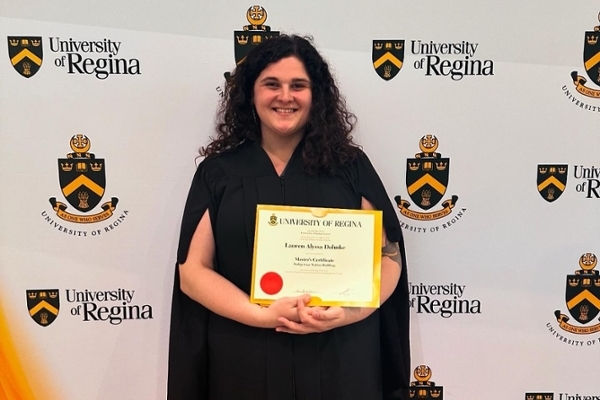
Amplifying Indigenous voices
Lauren Dahnke's journey towards reconciliation and making space for Indigenous ways of knowing in various aspects of work.
By Charvee Sharma“Completing the MCert program has strengthened my commitment to learning, relearning, and unlearning societal patterns for a meaningful reconciliation,” said Lauren Dahnke, our first graduate of the Indigenous Nation Building Certificate program from the University of Regina campus.
Dahnke’s passion for embracing and empowering Indigenous voices is reflected in her career aspirations, which include pursuing a Master of Public Administration (MPA) and making space for Indigenous ways of knowing into various aspects of her work.
Jointly offered by the First Nations University of Canada (FNUniv) and Johnson Shoyama Graduate School of Public Policy (JSGS), the Graduate Certificate in Indigenous Nation-Building aligns with the Calls to Action issued by the Truth and Reconciliation Commission of Canada (TRC), emphasizing the inclusion of Indigenous knowledge systems and governance.
Inspired to further her educational journey in reconciliation, Dahnke saw the MCert program as a perfect opportunity. “Being able to continue learning from professors like Danette Starblanket and Merelda Fiddler-Potter, who shaped my undergraduate experience and ignited my passion for Indigenous Ways of Knowing has been invaluable,” she said.
“These professors have not only contributed to the creation of this graduate program but have also become mentors and allies whom I will continue to work alongside in the years to come.”
Currently, as a program manager for a long-term housing program that supports women and children escaping interpersonal violence, Dahnke draws on her decade of experience in the public service, disability support and community engagement roles to create positive action.
“As a third-generation settler, I recognize the colonial history of cultural genocide, which has left our society and community fractured even today,” she said. “We need to re-evaluate and re-think the relationship between Indigenous and non-Indigenous peoples, along with existing institutions and systems of governance.”
By continuing her education and spreading awareness, Dahnke aims to contribute to meaningful change. “Incorporating Indigenous knowledge starts with education and an open mind,” she said.
Dahnke encourages students to use the same approach when studying course content. “Dive in fully and immerse yourself in the courses. Be open to discomfort and ready to recognize biases and areas in policy and government that need re-evaluation.”
Grateful for having a sense of community at JSGS, she urges others to “collaborate, build relationships, and learn from each other”. “The professional connections you make will extend far beyond the walls of JSGS, and you’ll be proud to join the alumni network.”
Having completed her Master’s Certificate, Dahnke now plans to advance her studies at JSGS, working towards an MPA. With her eyes set on the future, she aims to work with non-governmental organizations to deliver on the Calls to Action and improve systems that support all people, regardless of their background or lived experiences.
“I aspire to drive change, build relationships, and uplift others. Community is everywhere, and within it, we find connection.”
Together, we will work towards Truth and Reconciliation. We invite you to join by supporting Indigenous achievement at USask.

